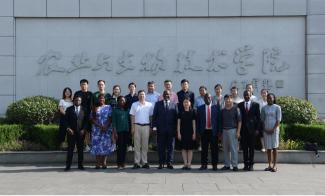
China-Africa Partnership Program to Advance Agricultural Research and Rice Production. Ghana’s Ambassador to China, H.E. Dr.Winfred Nii Okai Hammond has emphasised that Africa needs to shift from being a net food importer to achieving self-sufficiency by improving productivity and investing in technology. Speaking at a workshop at Zhejiang University on August 22, 2024, Dr. Hammond highlighted the critical role of agriculture in Africa’s economic transformation and praised China's remarkable success in lifting its population out of poverty through strategic investments in agriculture. “Without agriculture, we would be nowhere. China has shown us the way,” he added, urging African leaders to adopt similar strategies to boost food security and reduce rural poverty. He highlighted Ghana’s commitment to strengthening the Ghana-China partnership for the inclusive transformation of agriculture.

H.E. Dr. Winfred Nii Okai Hammond
The workshop was part of West Africa Centre for Crop Improvement (WACCI), University of Ghana, visit to College of Agriculture and Biotechnology, Zhejiang University under the China-Africa Institute Partnership Program launched last year to foster collaborative research and support rice production in Ghana and other West African countries. The event provided a platform to discuss ongoing efforts and future strategies for enhancing agricultural productivity in Africa, with focus on rice.

Prof. Zhou Yanhong, Vice Dean of the College of Agriculture and Biotechnology at Zhejiang University, chaired the workshop, which featured presentations from several distinguished participants. Ms. Jiang Mengu provided an insightful overview of Zhejiang University, outlining its various departments, institutions, exchange programs, and international collaborations.

Ms. Jiang Mengu
In a presentation, Prof. Eric Danquah, Founding Director, WACCI provided an overview of the University of Ghana. He highlighted the pressing threats to regional food security, especially in Ghana, emphasising the need for urgent action. He used the growing population to underscored that the country would soon have to produce more to feed additional mouths by 2030. Given that agricultural expansion in Africa has predominantly relied on land, he stressed the importance of sustainable agriculture. “We need to look at other countries like China to learn,” he remarked, pointing to the urgent need to reduce Ghana’s reliance on an import-driven food system.

Prof. Eric Danquah
One significant challenge highlighted by Prof. Danquah was the issue of brain drain. He noted that while WACCI has successfully trained many Africans, the retention of these skilled individuals in Africa remains crucial. “We have retained most of our students, which is very good. It is important to replicate programs like WACCI across Africa,” he stated, stressing the need for strategic collaborations and local government support to help research institutions address the continent’s challenges.
Prof. Qingyao Shu of the Advanced Seed Institute, Zhejiang University, who is also the Director of Zhejiang University-Wuxi Xishan Joint Modern Agricultural Research Center provided an overview of the China-Africa Partnership Institute Program, detailing its inception and progress. He recounted their recent visit to the University of Ghana and the rice research fields under the partnership. Prof. Shu outlined the existing challenges in rice production in Ghana. Despite these challenges, he recognized the great potential for rice production in Ghana.

Prof. Qingyao Shu
Prof. Shu emphasised the importance of localised research and collaboration, noting the need to tailor agricultural solutions to local conditions. “We need to focus on local problems and develop localised solutions, especially as challenges differ in Ghana compared to China,” he explained.
Prof. Shu also revealed the long-term plans of the two institutions to establish a Joint Laboratory to help in performing joint research projects to enhance rice production, reduce import dependency, and contribute to sustainable agricultural development in the Africa rice producing countries. He stressed the need for support from both the Chinese and Ghanaian governments.
Dr. Mavis Owusuaa Osei-Wusu, the Team Lead for the Rice Improvement Programme, WACCI, who is currently undergoing a three-month training at Zhejiang University under the partnership presented her work progress, experiences, and expectations. She noted that Ghana still struggles to produce enough rice to meet local demand, relying heavily on imports. She noted that her breeding programme at WACCI focuses on developing high-yielding, climate-smart, and disease-tolerant rice varieties for sub-Saharan Africa.

Dr. Mavis Owusuaa Osei-Wusu
She hopes to gain skills in gene editing and double haploid technology during her training at Zhejiang University. She believes this will greatly enhance her research in Ghana and help release varieties that would be beneficial to the country. She emphasised the importance of government support stating that the skills acquired during her training at Zhejiang University would have limited impact without investments in researchers, modern laboratories, and advanced research fields. She added, " for Ghana to develop, we must focus on agriculture and support research development “.
As part of their visit to China, the team paid a visit to Hupper Seeds and Zhejiang University-Wuxi Xishan Joint Modern Agricultural Research Centre to gain insights on modern technologies in rice breeding where Mr. Shi Feng, Executive Deputy Director of the Management Committee of Wuxi Xishan National Modern Agriculture Industrial Park took them round a tour on the facilities and what they do. The team also toured other agricultural facilities in Wuxi, Jiangsu Province, China.

Accompanying Prof. Danquah on this significant visit were Mrs. Jennifer Saint-Acquaye, Team Lead for Project Management, Facilities and Logistics, and Ms. Gloria Azumah, Acting Team Lead for Communications.
